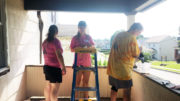This is the third of four releases presented by the Ellwood City Historical Society concerning the “We Can Do It!”, exhibit to be held at the History Center, 310 Fifth Street, Ellwood City.
FOUNDRIES OF FREEDOM
“Soldiers of production” accurately describes the nearly 7,000 men and women who worked in the mills of Ellwood City during World War II. Though not called to serve in the military, they were one of the most important cogs in the United States war machine. It’s no exaggeration to claim that they were a major reason for the Allied victory in the War.
Virtually all of the industries in Ellwood converted to wartime material production. The Ellwood Company was one of the few plants to shift its total manufacturing from its peacetime production to a completely different product essential to the war when it went from making plumbing fixtures to tank tread end links. When General Patton’s 3rd Army sliced across Europe, his tanks rode on treads made with those end links and on frames made of tubes manufactured by the Tube Mill. The Ellwood City Forge made vital crankshafts for warplanes that flew across the Pacific to blast Japanese invaders and decimate the enemy’s own war production capability in Europe. Aetna-Standard Engineering produced 37mm and 90mm anti-aircraft guns used to protect American GIs from enemy strafing.
There was much recognition of these efforts. The Ellwood Company, National Tube, Mathews Conveyor, and Aetna Standard were part of only 4,283 of the 85,000 manufacturing plants nationwide who received the coveted Army-Navy Production E award. Mathews Conveyor Company and National Tube were each one of only 776 companies earning three White Stars for that Award for continuing production excellence. And Aetna–Standard Engineering was only one of 206 plants nationwide to receive 5 White Stars for their “E” banner. In 1944 the Tube Mill set a record by shipping 27,000 tons of seamless tubing in May and they incredibly still increased tube production as a result of the June 6th D-Day Invasion. In November of that year, they were also only 1 of 2 Lawrence County plants and 1 of 51 of the 17,000 state-wide manufacturers to receive the National Security Award. In Addition, in 1942, Ellwood mills were 4th in the nation in per capita war bond deductions with most plants here maintaining a 100% payroll deduction rate throughout the war.
Industrialist E.E. Shwartzwelter, then President of Aetna-Standard Engineering, best expressed the sentiments of Ellwood City at that Plant’s Production E Award Ceremony when he stated: “We are American workmen.’ In this simple but thankful statement we give our answer and proclaim our defiance to the Powers which are endeavoring to wreck our great and free nation.”
It was the blood on the uniform of American Soldiers, Sailors, and Airmen that ultimately won the war. But it was the sweat on the clothes of the American workforce that staunched the flow of that blood to bring about the ultimate victory of freedom.
You can immerse yourself in the conditions that bred this working class fighting spirit by visiting the Ellwood City Historical Society’s presentation of the Senator John Heinz History Center’s traveling World War II display at the Ellwood City History Center, 310 5th Street, from December 2, 2017 to January 23, 2018. The exhibit, sponsored by Erie Insurance, the Eberly Foundation, and the Institute of Museum and Library Services, may be viewed throughout this period on Tuesdays, Wednesdays, and Thursdays from noon to 4:00 p.m., Fridays noon to 6:00, and Saturdays 9:00 a.m. to 4:00 p.m.
Next week: Odds and Ends





well I have to do this essay and I was wondering if you could add more to this?